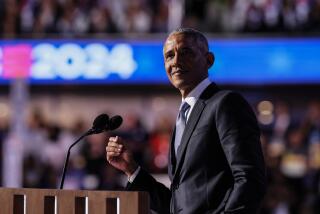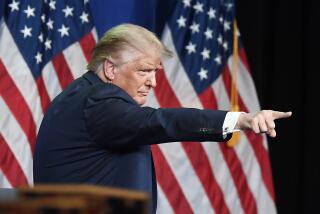Romney, Obama turn bipartisan — at least in their pitches
- Share via
CLEVELAND — In the final days of the presidential race, Mitt Romney and President Obama have, to varying degrees, embraced a theme they seldom voiced during much of the campaign: a desire for a new era of bipartisanship.
The imperative is to sway that elusive sliver of independent voters. It’s a tonal shift for Romney, who described himself as “severely conservative” in the primary and has been sharply critical of Obama’s “liberal agenda” all year.
He sounded very much like candidate Obama of 2008 as he campaigned Sunday in Cleveland, Des Moines and the suburbs of Philadelphia.
INTERACTIVE: Battleground states
The former Massachusetts governor says his Democratic rival, instead of creating the “post-partisan” era he promised, has engaged in “blaming, attacking, dividing” and has not met with Republican leaders since the summer.
“It’s not only Republicans that he refused to listen to; he also refused to listen to independent voices,” Romney said in Cleveland. “Instead of bridging the divide, he’s made it wider.... You hoped that President Obama would live up to his promise to bring people together to solve big problems, but he hasn’t. And I will.”
Obama, for his part, promised on Sunday in Concord, N.H., that he would “work with anybody of any party to move this country forward.”
“If you want to break the gridlock in Congress, you’ll vote for leaders who feel the same way, whether they’re Democrats or Republicans or independents,” he said.
Last week, Obama had the benefit of a fresh example of bipartisanship. The aftermath of super storm Sandy created a steady stream of images of the president working side by side with New Jersey’s Republican Gov. Chris Christie.
But the message requires a delicate balance for both candidates. Their rallies are generally attended by their most fervent and partisan supporters, who are primed to boo the opposing team.
INTERACTIVE: Outside spending shapes 2012 election
Romney campaigned Friday with Rep. Eric Cantor of Virginia, one of Obama’s most vehement critics in the House. On Sunday morning in Des Moines, Romney was introduced by Iowa Sen. Charles E. Grassley, who inaccurately suggested two years ago that Obama’s healthcare plan would allow the government to decide “when to pull the plug on grandma.”
Neither candidate has explained how he would break the deadlock in Congress, or smooth over the toxic relations between parties.
These days, Romney portrays his time as governor as an ideal of bipartisan governance, where he met with Democratic leaders weekly and put politics aside after the election.
Alluding to his work on universal healthcare in Massachusetts, Romney told Ohio voters Sunday that he “learned as a governor of my state that the best achievements are shared achievements.”
“Respect and goodwill usually go a long way and are usually returned in kind. That’s how I’m going to conduct myself as president,” Romney said. “I won’t just represent one party. I’ll represent one nation.”
The reality of Romney’s record in Massachusetts is more complicated. Romney used his line-item veto 844 times, more than 700 of which were overturned by the Legislature, according to an analysis by the Boston Globe.
A standard line in his closing argument is that if he’s elected, he won’t blame his predecessor — a dig at Obama — and will not pursue partisan legislation.
But he also says repeatedly that on Day One he will begin to pursue the repeal of the president’s healthcare program, which would touch off a fierce fight in Washington.
Obama, meanwhile, pointed to the response to Sandy as evidence of the sort of post-partisan spirit he often evokes.
“We see neighbors helping neighbors cope with tragedy; leaders of different parties working to fix what’s broken.... No matter how tough the times are, we’re all in this together,” he said Sunday. “We rise and fall as one nation and as one people.”
Former President Clinton was even more overt in praising Obama’s handling of the storm, saying it proved he “has the right philosophy about how to fix the mess we’re in.”
That philosophy extends to the looming “fiscal cliff” debate, Clinton said.
Obama has been more careful than Romney about not overtly promising bipartisan compromise post-election. Some in the Democratic base have viewed the president as a pushover, too easily rolled by Republicans in Congress. As he seeks to fire up Democrats in the final days, Obama also promises not to “surrender” on his priorities.
“If the price of peace in Washington is cutting deals to kick students off of financial aid, or get rid of funding for Planned Parenthood, or let insurance companies go back to discriminating against people with preexisting conditions … that’s not a deal I’m willing to take,” he said. “That’s not a price I’m willing to pay. That’s not bipartisanship, and it’s certainly not change.”
kathleen.hennessey@latimes.com
Reston reported from Cleveland and Hennessey from Concord.
More to Read
Get the L.A. Times Politics newsletter
Deeply reported insights into legislation, politics and policy from Sacramento, Washington and beyond. In your inbox twice per week.
You may occasionally receive promotional content from the Los Angeles Times.












